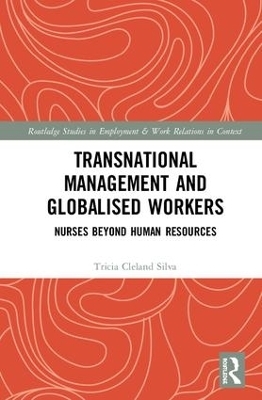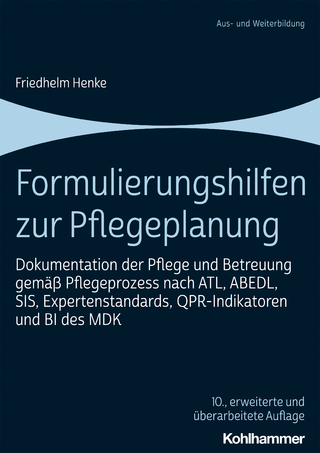
Transnational Management and Globalised Workers
Routledge (Verlag)
978-1-138-61401-7 (ISBN)
There are 60 million health care workers globally and most of this workforce consists of nurses, as they are key providers of primary health care. Historically, the global nurse occupation has been predominately female and segregated along gendered, racialised and classed hierarchies. In the last decade, new actors have emerged in the management of health care human resources, specifically from the corporate sector, which has created new interactions, networks, and organisational practices.
This book urgently calls for the reconceptualisation in the theoretical framing of the globalised nurse occupation from International Human Resource Management (IHRM) to Transnational Human Resource Management (THRM). Specifically, the book draws on critical human resource management literature and transnational feminist theories to frame the strategies and practices used to manage nurses across geographical sites of knowledge production and power, which centralise on how and by whom nurses are managed. In its current managerial form, the author argues that the nurses are constructed and produced as resources to be packaged for clients in public and private organisations.
Tricia Cleland Silva is a Lecturer and Post Doctoral Researcher at Hanken School of Economics, Finland. She is the co-founder of Metaphora International, a consultancy that works with finding meaning in management and strategy through stories and metaphors.
TRANSNATIONAL MANAGEMENT OF GLOBALISED WORKERS: NURSES BEYOND HUMAN RESOURCES
Introduction
Transnational human resource management of nurse labour
Aim of the book
The structure of the book
FRAMING: PART ONE
PERSPECTIVES ON TRANSNATIONALISATION OF CARE AND THE NURSE LABOUR MARKET
Transnational nurse labour migration: a macro overview
Regional and global flows of transnational nurse migration
Traditional nurse-migration patterns
Gendered migration of labour
Global care economies
Global care chains
Global Nurse Care Chains
Transnationalisation of care and producer-based care networks
Nurse work as gendered and racialised labour in work organisations
Coping management of nurse work
Inequality regimes in work organisations
Neoliberalism governance within the transnationalisation of care
Summary and concluding thoughts
FRAMING TRANSNATIONAL HUMAN RESOURCE MANAGEMENT OF NURSE LABOUR
Critical engagement within international human resource management
Critical theorists in HRM and IHRM
Transnational Feminisms
Organisations and institutional barriers to equality in a globalised world: the work of Joan Acker
Postmodernism and transnational organising: the work of Marta B. Calás and Linda Smircich
Outside organisations and outside the ‘international’: the work of Inderpal Grewal and Caren Kaplan
Outside organisations and neocolonial structural controls: the work of Chandra Mohanty
Working with transnational feminism(s)
Transnational human resource management: the case of producer-based care networks
Summary and concluding thoughts
SITUATING: PART TWO
REPRESENTATIVES AND SOCIAL WORLDS IN TRANSNATIONAL HUMAN RESOURCE MANAGEMENT OF NURSE LABOUR
A situated approach to mapping transnational human resource management of nurses
Collecting data on the conditions of the situated story
Representative entrepreneurs, implicated actors, and social worlds
Interviews: gaining access to social worlds
Documentary method: material presence of social relations and actions
Participatory observations: maps, memos, and reflection of the situation and its social worlds/arenas
Research diary entries and personal reflection/self-analysis
Research interest situated in lived experience
Summary and concluding thoughts
MAPPING SOCIAL WORLDS THROUGH DISCOURSE, TEXT, AND MATERIALITY
What is discourse and why analyse it?
Varieties of discourse analysis
Core dimensions of discourse analysis
Theoretical approaches to discourse analysis
The material-discursive and multi-domains approach to discourse
Discourse analysis of this research: some comments about linguistic language use and situated knowledge
Situational analysis as approach to discourse, power and materiality
Ordered situational maps
Social worlds/Arena Maps
Positions in discourses
Summary and concluding thoughts
A SITUATION: PART 3
TRANSNATIONAL MANAGEMENT OF NURSES IN PRODUCER-BASED CARE NETWORKS IN FINLAND
Establishing the arena of producer-based care networks
Preparing for import: making a case out of the recruitment of nurses from the Philippines
Pioneering the supply practice of transnational nursing labour
Making Finland attractive to recruit immigrant professional workers public representatives asserting more dominance
The legitimisation of nurse imports during economic recession
Situating transnational management of nurses
Summary and concluding thoughts
DISCURSIVE POSITIONS AND STRUCTURAL BARRIERS TO EQUALITY IN TRANSNATIONAL HUMAN RESOURCE MANAGEMENT
The Philippines as a source for nurse human capital and the warm, optimistic Filipino nurse
Standardised work requirements of Filipino nurses and the use of Finnish language in the workplace
Organising the general requirements
Class hierarchies
Recruitment and hiring
Wage setting and supervisory practices
Informal interactions while ‘doing work’
Discursive positions on ethical recruitment
Structural inequality barriers through transnational human resource practices
Summary and concluding thoughts
CONCLUSIONS
Mapping the social worlds of transnational human resource management
Transnational human resource management: a theoretical contribution
Transnational human resource management of nurses: an empirical contribution
Mapping social worlds in the arena of producer-based care networks: a methodological contribution
Policy implications
Not the end of the journey: future research possibilities
| Erscheinungsdatum | 30.09.2018 |
|---|---|
| Reihe/Serie | Routledge Studies in Employment and Work Relations in Context |
| Zusatzinfo | 11 Tables, black and white |
| Verlagsort | London |
| Sprache | englisch |
| Maße | 152 x 229 mm |
| Gewicht | 476 g |
| Themenwelt | Medizin / Pharmazie ► Pflege ► Pflegemanagement / Qualität / Recht |
| Wirtschaft ► Betriebswirtschaft / Management ► Personalwesen | |
| Wirtschaft ► Volkswirtschaftslehre ► Makroökonomie | |
| ISBN-10 | 1-138-61401-7 / 1138614017 |
| ISBN-13 | 978-1-138-61401-7 / 9781138614017 |
| Zustand | Neuware |
| Haben Sie eine Frage zum Produkt? |
aus dem Bereich


